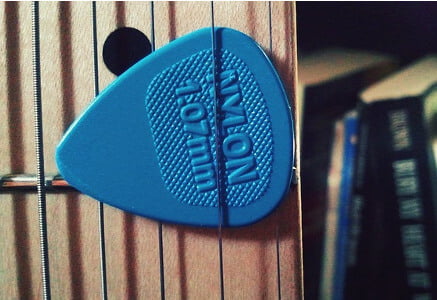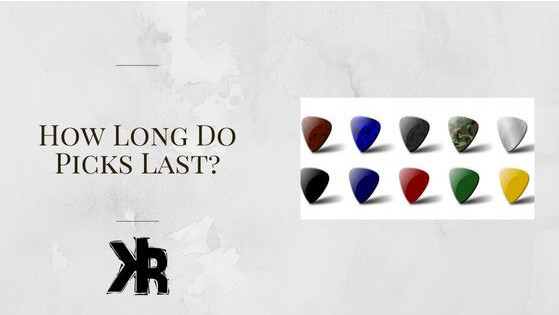Table of Contents
Guitar picks don’t often stick around very long. Usually, it’s because they get lost, as they’re pretty small and hard to keep track of. That being said, if you’re careful with them, you can get some pretty serious use out of them.
The short answer, guitar picks last different lengths of time for many types of players. For the average guitarist, a pick should be expected to last between a couple of weeks and a month.
There’s a lot to know about how long guitar plectrums last and what you can do to increase their longevity. In this article, you will finally get your answer to the question: How long does a guitar pick last?
Do Guitar Picks Wear Out?
As mentioned earlier, a guitar pick can last for varying lengths of time. It’s less about how many months or weeks you use it for, and how often you actually work it. For an average guitarist who plays for an hour or so every day, a pick will last for between a few weeks and a month.
After that, it will start to break down. Eventually, it will become less comfortable and less effective to use as they begin to wear.
You will know your guitar pick has worn out when it has:
- Grooves
- Rounded tips
- Frayed edges and loose material
- Cracks
- Stress marks
However, guitar plectrums can also break. This can happen after a lot of use and tear, or just occur fairly randomly after a weird or awkward strum. If your guitar picks breaks, snaps, or cracks, you’ll most likely not be able to use it comfortably anymore.
How Long do Guitar Picks Last for Professionals?
But what if you’re using your guitar a lot more than average? For advanced players, how long does a guitar pick last?
If you’re using your pick a lot more than the average player, it will obviously wear down and break far faster. For professionals who play studio sessions and practice all day. Plectrums can begin to wear down very quickly. Some guitarists even go through a pick-a-day!
If you plan on playing enough guitar that this would be a concern, it’s recommended to get very durable picks. And stock up on a bunch of them!

Are Some Picks more Durable Than Others?
Some are definitely more durable than others. Just like any other type of music equipment, it’s not all created equal. Because of this, there are some picks that will wear down and break far faster than others.
That being said, more durability doesn’t always mean better picks. Some guitarists prefer the sound or feel that comes with playing with a thinner pick. Different plectrums can also be useful for a variety of styles and techniques. You should focus on how it feels and sounds more than how durable it is when making a selection.
That being said, getting a durable pick can be a nice bonus, as you don’t have to go back and buy more quite as often.
What Factors Affect Pick Durability?
So what kinds of picks are the most durable? Well, there are a number of different factors that can impact how long it’s going to last.
- Thickness
- This is one of the main factors that decide how long a plectrum will last after repeated playing. The thicker it is, the less likely it is to wear down quickly. It will also be harder to break outright, meaning that they will last longer on average. Thick picks are a fantastic choice for those who want them to last a long time.
- Material
- Picks aren’t all made of the same materials. That being said, what your plectrum is made of makes a big difference when it comes to how long it’s going to last. As you might assume, harder types wear down slower. Almost all picks are made from some kind of plastic, but those that are harder will be far more durable.
- Size
- Believe it or not, the size makes a difference as well. If you’re not playing a pick that’s the correct size, it may be more likely to break. Make sure you’re playing one that fits in your hand. While still being large enough to touch the strings and not your fingers. The correct size of the pick is different for everyone, so try a few out.
- Shape
- Picks with sharp tips have a brighter tone, but that tip can sometimes break off. They can also wear down pretty quickly. Since the surface area you’re striking is slightly smaller. But, rounded picks are less likely to break. Yet, the tone is more important, so choose the shape based on that first.
- Playing style
- Lastly, one of the major factors that can affect how long your guitar pick will last is how you play. If you’re doing standard strumming and picking, it will last longer. Certain techniques, such as fast picking, and tremolo will make it wear down faster. That’s not to say you shouldn’t do these techniques. Just be aware that they’ll damage your plectrums a little more.
When Should You Replace a Guitar Pick?
So when should you replace your guitar pick? Well, the tell-tale sign is that the edges are becoming more rounded. If the edges are becoming rounded, you could lose some of what makes your tone what it is.
However, picks with rounded edges aren’t useless. They can be used for mellower tones, so it can be pretty good to keep them.
If you’re using more intense picking techniques. Check for cracks and chips in the edges of your plectrum. These are certainly a sign your pick needs replacing.
Can You Make a Guitar Pick Last Longer?
While pick wear is inevitable, there are some things that can be done to make them last longer. Get as much use out of them as possible.
- Choice of material: If your guitar pick is not made from the right substance. It will break down sooner than others that can handle more aggressive techniques.
- Select the right width: a thinner pick will not stand up to aggressive strumming for long.
You will also benefit from having the right size and shape. This will help to strike the guitar pick at the proper angle. It will prevent the edges from wearing out prematurely. If you consider these few points, you can expect more life from your picks.
FAQs
Will a worn-out pick affect playing technique?
One of the most common ways to know that your guitar pick is worn is when it’s difficult to play certain techniques.
A worn-out pick can interfere with playing methods in such a way that it slows you down. A worn-out tip or any tears can also catch on the strings, making it hard to solo or strum.
Once your guitar pick has become uncomfortable and is making it hard to play, it’s best to use a new one.
Do guitar picks break?
If your playing techniques are more aggressive, a guitar pick is likely to wear much quicker. There are many other reasons why they wear, as we touched on earlier, but it’s not uncommon for a pick to break.
If they are thinner and put under a great deal of stress, a pick can just tear and break apart while you are playing.
To prevent them from breaking, it’s better to use the right pick for the aggressive techniques.
Why does my pick keep breaking?
Do you have a recurring issue with guitar picks breaking? Then there is a good chance that they are not the right ones for your technique.
We all have a specific type that we like, but that doesn’t mean they are right for your play style. You need to first consider how hard you play and what it is you are doing when they break.
Is it heavy strumming or picking? Maybe you are playing shred when the pick breaks? Find out when this happens, and then decide if perhaps the plectrum just isn’t made for this heavy style. You may need a type that is harder or thicker.

